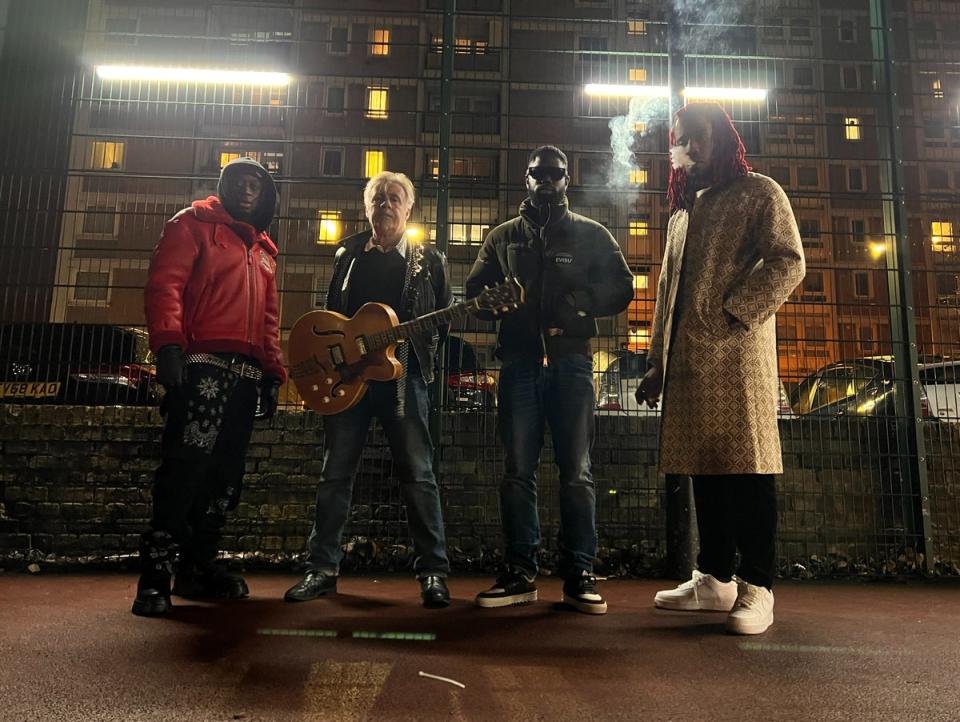‘The expectation for someone like me is go to jail or die’: Rapper Avelino on poverty, independence, and why rap is the new punk

- Oops!Something went wrong.Please try again later.
It was three years ago that Avelino announced – his words – “the greatest rap debut in British history”. This Friday, the north-London-based artist’s album is released at last. So, what took him so long? “You can’t rush greatness,” he says with a cool shrug. In the event, God Save the Streets could hardly have been better timed. Out less than a month before the coronation of King Charles and Queen Camilla, it is loaded with nuanced ruminations on poverty, mental health and authority, with the new monarchy serving as a dubious backdrop. The title’s obvious reference to the Sex Pistols’ 1977 single “God Save the Queen” is deliberate. “Rap is the new punk,” Avelino declares.
“You look back at [the Seventies] and that was the music of their generation, the music of the streets.” He captures its defiant spirit on single “Vex”, a sizzling concoction of trap beats and futuristic-sounding synths: frequent collaborator Ghetts brings his trademark enunciation and dry wit (“I went to various schools but that’s not why I’ve got principles”), while Backroad Gee snarls and snaps. “I felt like the word ‘vex’ embodied the energy and power we associate punk with,” Avelino says. To amplify that message even further, he enlisted a real-life Sex Pistol, bassist Glen Matlock, whose ominous guitar line snakes through the track.
His debut may have been a while coming, but the 29-year-old rapper has commanded the respect of his peers for the better part of a decade, starting out with YouTube releases under the moniker AA before rising to wider recognition with his second mixtape, 2014’s Iconic Ambition. By the time he was 25, he’d already brought his deft wordplay and snappy delivery to Stormzy’s headline tour in 2015. Two years later, he appeared on the coveted Fifa soundtrack alongside Skepta and Stormzy on “Energy”, a menacing, synth-driven growl of a song. “Don’t pull up to my tour if you got no energy,” Stormzy warns listeners. Clearly, Avelino sets high standards. Does he ever feel pressure, with so many eyes on him? “Nah,” he says. “I don’t need praise.”
Born Achi Avelino in Angola, the middle child among six brothers and sisters, he moved with his family to the UK when he was three years old. “Young refugees, you know, growing up here a proud British citizen,” he says. We’re sitting in the bar of a central-London hotel. Avelino, nursing a glass of water, speaks in a low murmur. Yet even if you ignore his hair, dyed bright crimson, and his 6ft 3in frame hunched over the table, he has a magnetic quality, a calm confidence. At school, he got up to mischief – nothing serious, but enough that he spent more time roaming the corridors with his mates than in the classroom. He’s been told a few times that he could have ADHD, but he isn’t so sure. “It didn’t make sense, because I don’t lose concentration when I’m making bars or playing PlayStation, or football,” he shrugs. “Maybe I just wasn’t interested in what I was being taught at the time. You get bored, and so you want to be disruptive.”
US hip-hop giants such as Biggie, Tupac and Busta Rhymes were his early idols, but it wasn’t until he discovered homegrown artists – Kano, Wretch 32 and Ghetts among them – that he began to see rap as a possibility in his own future. “You’d see Wretch go to the corner shop or something, and think that this was something tangible, a realistic thing to pursue,” he says. Instead of telling anyone how he felt, he wrote it down as lyrics. While his parents worked seven jobs between them, his childhood bedroom filled up with reams of paper, stuffed into drawers, cupboards. “It was almost an addiction,” he says. “I’d found a way to vent.”
That early impulse to write down his thoughts and feelings has since evolved into the fiery, politically conscious lyrics you hear on God Save the Streets. “I’m more anti-poverty than anti-establishment,” Avelino explains, though he’s clearly no royalist either. On Twitter, he’s busy promoting his album with statements such as: “GOD SAVE THE STREETS, NOT CHARLES.” But this, along with the album cover’s playful nod to the Sex Pistols’ artwork – not to mention the national anthem ringing out on the title track – feels more tongue-in-cheek than anything else. Avelino’s deeper concern is how he can help encourage people to change their own lives. “We’ve got better chances of turning our fortunes around if we change the way we relate to the world,” he says. “I’ve seen people who’ve feared poverty their whole lives, and stay there. But actually what happens is, when you replace that fear and actually use it on figuring out how you’re going to make things happen, when you notice the riches [in life] – friends, family, health – that have nothing to do with money... life all of a sudden becomes more productive.”
Yet he’s also keenly aware that it’s not always so simple; society often steers individuals from certain backgrounds along set paths. “Vicious Cycle” addresses the “same old story” of “trying to go from the gutter to glory”, both criticising and empathising with that get-rich-or-die-trying ethos. “The expectation for someone like me, coming where I’m from, is to make nothing of yourself,” he says now. “Go to jail. Die. One of the two.” He hopes to lead by example. During the pandemic, he became inspired by self-help books, including Psycho-Cybernetics by Maxwell Maltz, which seems to have foreseen the current trend of “manifestation”. On Avelino’s album, gang member turned motivational speaker and youth worker Marvin Herbert can be heard recounting his time on the streets, reflecting on how he turned his life around.

Avelino certainly believes in the idea that you can, in some ways, “will yourself” towards productivity or success. “Look, the absolute truth is that everyone’s circumstances are different,” he acknowledges. “Everyone has a different opportunity in front of them, but we can all go one better and create our own.” He applied this mentality while working on the new record. In the past, he struggled to get things flowing without the aid of a drink, or two; God Save the Streets was written while he was pretty much sober. “Honestly, I don’t feel like I worked hard on this [project],” he admits. “And it’s my best. I actually started getting to bed early. I stopped drinking alcohol so much, where I used to depend on it to make music.”
Like Ghetts, who on “Vex” takes a light swipe at “man [who] don’t know about indie ’cos them boy they’re always at the label”, Avelino remains staunchly independent as an artist. “It wouldn’t make sense,” he says of the prospect of getting signed. “I couldn’t take from the Sex Pistols and give [this album] to a major label, do you know what I mean?” On the profound album-closer “Acceptance”, he looks to the future and away from his past. “Did I really need to stress or did I just need a new perspective?” he questions. He asks for forgiveness from those he’s hurt and pledges to forgive the ones who’ve wronged him. “Never forget where you came from, but I ain’t going back,” he says, as the national anthem begins to play distantly once more.
“For me, ‘Acceptance’ was the perfect way for me to end the album because a lot of us are just on autopilot [in life],” he says. “You’ve got your vices, you can just drift through life, but actually it’s self-destructive.” Avelino wants to be present, even if that means he makes mistakes every now and again. Well, no one’s infallible, right? He laughs: “As much as I think I am, I know I’m not.” A slight pause. “But I’m stronger than I’ve ever been.”
‘God Save the Streets’ is out this Friday

